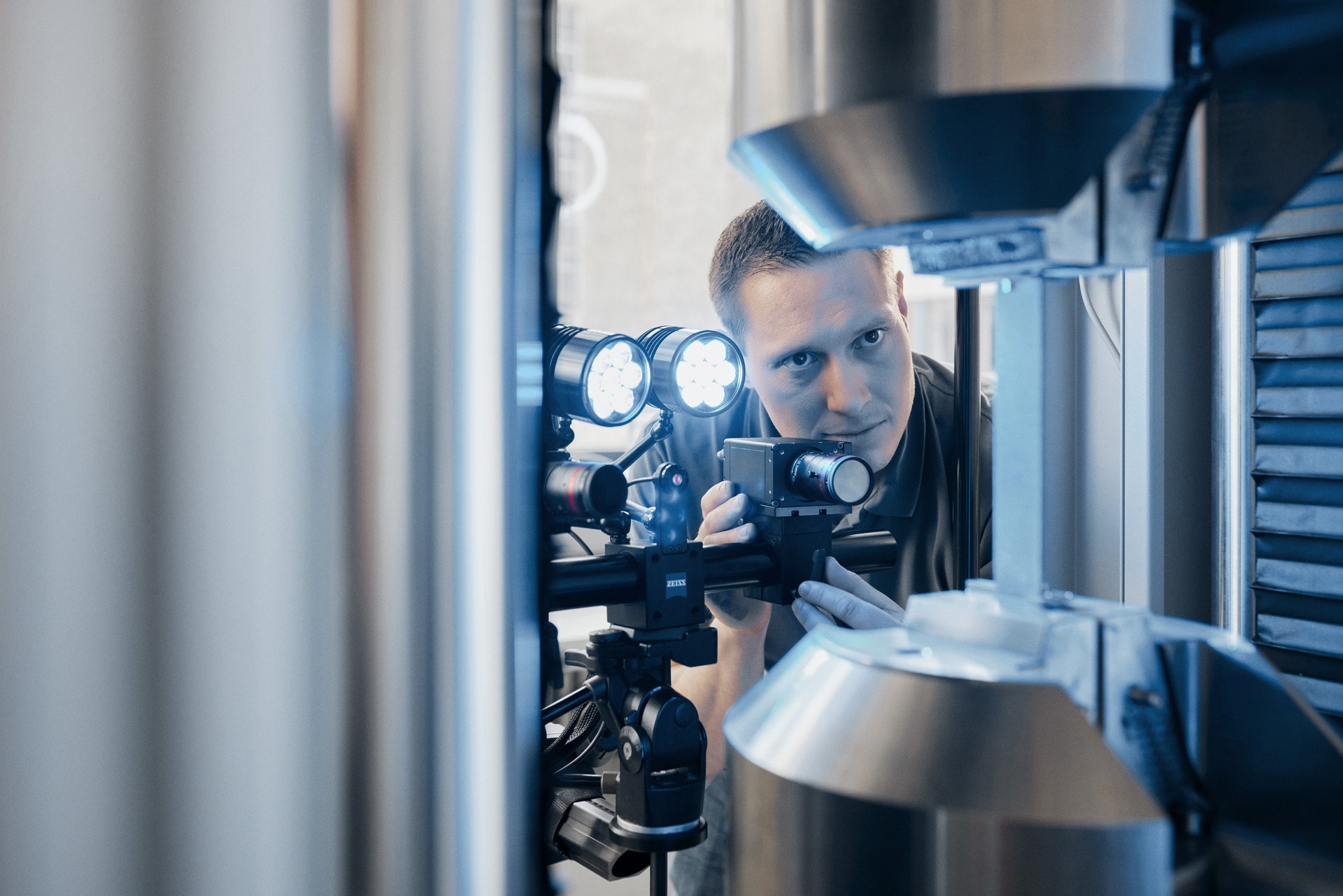What is a DAkkS Accreditation?
What is a DAkkS Accreditation?
An accreditation is a confirmation that a conformity assessment body – e.g. a testing or calibration laboratory or a certification body – has the professional and technical competence, reliability, independence and integrity to perform the service described in the scope of the accreditation. Verification and confirmation are carried out by an impartial national accreditation body, which acts as an authority on behalf of the state. In Germany, this role is assumed by the DAkkS (German Accreditation Body). Accreditation is based on various standards, such as DIN EN ISO/IEC 17020 for inspection bodies, DIN EN ISO/IEC 107025 for testing or calibration laboratories or DIN EN ISO/IEC 17065 for product certification bodies. An accreditation deed is issued as official certification.
As a rule, DAkkS accreditation is granted for an unlimited period. However, regular reviews in the form of audits take place by the accreditation body to ensure that the requirements continue to be met. If this is not the case, the accreditation can be restricted, modified or withdrawn.
What is the Role of DAkkS as an Accreditation Body?
DAkkS is the national accreditation body in Germany and fulfills an important role in ensuring the quality and trustworthiness of products and services. The task of the DAkkS is to assess and confirm competences of conformity assessment bodies, such as certification bodies, testing laboratories or calibration laboratories, on the basis of national and international norms and standards.
The DAkkS awards accreditation and approval certificates to bodies that meet the requirements. Accreditation by DAkkS confirms technical competence and compliance with the requirements laid down in the relevant standards and regulations. In addition, DAkkS supports the application of internationally recognized practices and standards, thus promoting international trade.
What are the Legal Foundations of a DAkkS Accreditation?
DAkkS accreditation is based on various national and international standards, laws and regulations. In Germany, the Accreditation Body Act (AkkStelleG) is the authoritative legal basis for DAkkS accreditation. The Accreditation Body Act defines the tasks and competences of the DAkkS as a national accreditation body and regulates the recognition of conformity assessment bodies.
At the international level, the DAkkS, as the national accreditation body for Germany, is a member of the International Accreditation Federation (IAF) and the European Cooperation for Accreditation (EA). DAkkS accreditation is based on various international standards, in particular ISO/IEC 17011 for the requirements for accreditation bodies, ISO/IEC 17025 for testing and calibration laboratories and ISO 15189 for medical laboratories. Compliance with national standards such as DIN EN ISO 9001 for quality management systems may also be relevant for DAkkS accreditation.
Why is a DAkkS Accreditation important?

In many areas, tests, calibrations, certifications or inspections are of great relevance. They are used to examine whether the verified processes, systems, services and products are reliable in terms of their quality and safety. They check whether the requirements of relevant standards, laws and other specifications are met, i.e. whether there is conformity with them. Hence the name conformity assessment for all these assessment services.
DAkkS accreditation therefore confirms that this conformity assessment is carried out correctly and thus also ensures the safety and quality of end products and services. In this way, it reduces consumer risks, risks in everyday life and working environment and is thus a great support for consumer protection. It ensures an independent and objective assessment of the technical competence and performance of a body. Accreditation by DAkkS demonstrates that a body is capable of providing its services to high standards. This means that customers who use the services of an accredited body can be sure that the body performs its work at the highest level. DAkkS accreditation also certifies that a body is capable of meeting the requirements of applicable standards and regulations.
DAkkS accreditation also offers the advantage that companies can better position their services on the market. By using DAkkS accreditation as recognition of their competence and high standards, companies can increase their trust and credibility with customers.
What are the Requirements for a DAkkS Accreditation?
In order to be accredited by DAkkS, a body must meet certain requirements. These requirements are defined in the DIN EN ISO/IEC 17025 standard and the DIN EN ISO/IEC 17020 standard and include the following aspects:
- Sufficient technical competence and experience to perform its services independently and objectively
- Adequate organization and structure to do their work effectively and efficiently
- Sufficient resources, such as personnel, equipment, and infrastructure, to perform their services
- Use of procedures and methods that are state of the art and scientifically sound
- Performing services in accordance with applicable standards and regulations
- Establishing a quality management system that ensures that their work is performed at a high level of quality
- Conducting regular internal audits and continuously improve their quality management system
How Does the DAkkS Accreditation Procedure Work?
The DAkkS accreditation procedure is a multi-stage process comprising various steps: Application, preliminary assessment, on-site assessment, decision and surveillance.
The most important steps to go through from application to granting of accreditation:
- Application: The company submits an application for accreditation to DAkkS.
- Assessment: DAkkS examines the application and carries out a preliminary assessment. Here, the company's documents are reviewed and it is checked whether all requirements are met. If the preliminary examination was successful, an on-site assessment takes place. Here, the accreditation body will review the company's facilities, work processes and personnel.
- Accreditation Decision: The Accreditation Committee evaluates the results of the assessment and only then decides whether to grant accreditation. If the decision is positive, the audited body receives the accreditation certificate including the accreditation symbol.
- Surveillance: With regular reviews, DAkkS ensures that the company continues to meet all requirements. Internal audits, further developments and improvements of the management system and procedures are carried out on the premises.
The DAkkS accreditation process may vary depending on the company and the field of activity, but this process gives a general idea of how the process works. Companies seeking DAkkS accreditation should contact the DAkkS accreditation body for more information and to start the process.
ZEISS meets all DAkkS requirements and holds the relevant accreditations. Each laboratory has its own accreditation. Because precise measurement results and trustworthy measuring equipment are crucial in all industries. With ZEISS, you can be sure of getting standard-compliant and high-quality results and equipment. Quality and safety are always at the forefront. Customers can always rely on the company's expertise and many years of experience.
What are the Advantages of a DAkkS Accreditation?
DAkkS accreditation brings several benefits, such as:
- Credibility and trust: A DAkkS accreditation gives customers, partners and suppliers confidence that the company performs its work at the highest level and delivers reliable results. This can also help to attract new customers.
- Meeting regulatory requirements: In some industries, DAkkS accreditation is required by law. Meeting these requirements is necessary to avoid legal consequences.
- Competitive advantage: With DAkkS accreditation, a company can gain a competitive advantage. DAkkS accreditation shows that the company performs its work at a higher level than other companies in the industry.
- Improved image: DAkkS accreditation can help a company improve its reputation and image.
- Access to new markets: DAkkS accreditation is often a prerequisite to operate in certain markets. An accreditation thus opens up new business opportunities and can help to expand business.
DAkkS accreditation thus brings many benefits that can help a company achieve its goals.
Difference Between DAkkS Accreditation and Certification
A DAkkS accreditation and a certification are two different types of qualification. While a DAkkS accreditation confirms the technical competence of a conformity assessment body (e.g. testing laboratory or calibration laboratory), a certification confirms the conformity of a product, service or management system with a specific norm or standard. Both types of qualification have their own specific applications and are used in different industries and situations.
A DAkkS accreditation is awarded by DAkkS and confirms the technical competence of a conformity assessment body to perform specific activities, such as calibrations, tests or inspections. Accreditation is a comprehensive process that ensures the laboratory or facility meets the necessary requirements to provide independent, accurate and reliable results.
Certification, on the other hand, is issued by an independent certification body and confirms that a product, service or management system meets the requirements of a specific norm or standard. There are different types of certifications, such as product certifications or management system certifications.
Importance of the DAkkS accreditation for the Metrology Industry
DAkkS accreditation is of great importance to the metrology industry as it ensures a high level of competence and quality in the calibration and testing of measuring instruments. Through accreditation, customers can be sure that the services of an accredited company are performed on a sound basis and according to recognized standards. Likewise, accreditation ensures that the measuring instruments manufactured by the company will perform with high precision. For providers of calibration and testing services, DAkkS accreditation means confirmation of their professional competence and a strengthening of their competitive edge. In addition, accreditation facilitates international trade as it represents recognition of the competence and quality of German calibration and testing laboratories.
At ZEISS, you can have DAkkS-accredited contract measurements performed or work with the high-quality ZEISS measuring instruments yourself. Benefit from the many years of experience and proactive development of measurement technology at ZEISS. You can also visit a ZEISS Quality Excellence Center near you to discuss the focus topic "Experience the benefits of DAkkS testing first-hand", bring along your own components or drawings and discuss and debate possible solutions. Feel free to stop by and visit us!

